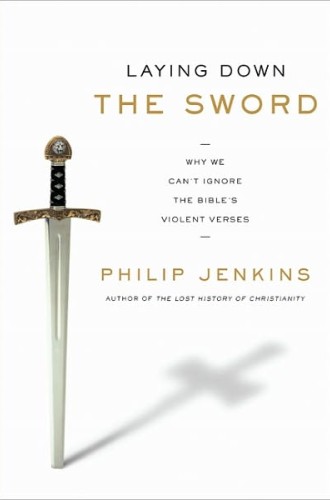Terrifying texts
Hardly a week goes by in which parishioners do not grill me about my friendly openness to Islam. They believe that the Qur'an not only permits violence but mandates it. Almost as frequently, I receive hard inquiries about why we should bother with the Old Testament, which seems to be riddled not just with warfare but with divinely sanctioned warfare. I counter both challenges in various ways, but I had never thought to explore how the two questions might actually be one.
Leave it to the astonishingly productive Philip Jenkins to lay the groundwork for such an exploration. If I run a search for Jenkins's publications, I am not sure whether to shudder, chuckle or drop my jaw in awe. Terms like polymath, outlier and wunderkind come to mind when I notice that he has written on early christological battles, styles of Christianity in the Southern Hemisphere, hidden gospels, sexual abuse in Catholicism, cults, Native American spirituality, Europe's religious crisis, the histories of Wales and the United States, and even criminal justice, pornography and terrorism. The common thread among these diverse topics—except, perhaps, the history of Wales—is that these are subjects that matter not only to scholars but to citizens of the world.
Read our latest issue or browse back issues.
A cynical little demon perched on my shoulder as I began reading Laying Down the Sword, which is more Old Testament exegesis and hermeneutics than anything else. Old Testament is my field; surely he can't have mastered that too. But Jenkins's scholarship is reasonably well informed, with no major gaffes, and the interdisciplinary edge he brings to the task makes his analysis quite insightful. For example, his background in sociology helps him to explain what happens to a community when its scriptures create cognitive dissonance and ethical dilemmas.
What Jenkins has that no Old Testament scholar has is a platform, a bully pulpit. He has proved himself as one who is learned, who writes with clarity (if not achieving stylistic wonder) and who understands why scholarship matters beyond the academy. He is a teacher—in the classroom, of course, but also in his writing. And in Laying Down the Sword he probes a subject with which every thinking person needs to be familiar.
Jenkins spends the bulk of the book analyzing the violent texts in the Bible—not those in the Qur'an, which some readers will wish he had discussed more than he does. Most Christians have some vague sense that the violent passages in scripture are there, but they haven't paid close attention. Those Christians who do deal with the problem of such texts being in their scriptures typically embrace the Marcionite route of simply dismissing the Old Testament as unworthy of the true God of grace, or they follow the progressive-revelation stratagem of figuring we've advanced light-years beyond antiquity's bellicose misconstruals of God's real nature.
This project, which began as an extended piece in the Boston Globe's "Ideas" section in 2009, is more nuanced than simply saying, "We have gruesome, hideous, embarrassing texts too." What interests Jenkins is the process by which a faith tradition copes with difficult texts: the very fact that the texts are considered something to cope with is extraordinary evidence of the ultimate worth of those religious traditions. Jenkins writes:
As religions grow in scale and sophistication, they evolve to the point that they realize the failings and limitations of portions of those original scriptures. . . . The uglier we come to find texts such as Joshua, the more appalled we are by the slaughter of the Canaanites and the Amalekites, the more evidence we have of the success of the biblically based religions, rather than of their primitivism or blood lust.
It's a surprising proposal: the presence in scripture of texts that cause us to shudder sets in bold relief the nonviolent heart of our faith.
Christians as well as Muslims have devised hermeneutical strategies that can counter, explain and even spiritualize texts that depict God as requiring violence. Jenkins's way of assessing Deuteronomic texts about the conquest of Canaan is similar to two assertions I have made in my teaching over the years. First, brutal warfare was common in the biblical world, and the texts reflect this sad reality. (However, I am not sure I would agree with Jenkins's conclusion that the Israelites' savagery exceeded even that of the Assyrians.)
Second, the passages saying that God demanded extermination of the Canaanites were written many centuries after the fact. My suspicion has always been that when the Israelites confessed that their troubles over time were caused by their mixing with the Canaanite people and their idols, they wished that they had gotten rid of those Canaanites way back when—but in reality, no wholesale slaughter took place. Like Jenkins, I find ironic delight in the fact that archaeology simply does not sustain the biblical account of the conquest.
Lest we think that Islam has a corner on the ferocious acting out of ancient scriptures in modern times, Jenkins guides us on a whirlwind survey through history, recounting the horrors of Afrikaners, Zionists, Scottish Presbyterians and Rwandans parroting Bible passages as a warrant for genocide. Of particular interest is Jenkins's case that the renowned archaeologist William F. Albright provided veiled support for his personal Zionist leanings at the expense of Palestinians in the way that he wrote approvingly of "superior" peoples subduing "inferiors" during the conquest of Canaan.
The most salutary thought in Jenkins's book is perhaps the most obvious: violence in scripture does not cause violent action, whether the scripture in question is that of Christianity, Judaism, Islam or any other great religion. Vicious texts have always been there for the taking, but rarely have adherents seized upon them. Scripture and behavior are quite distinct—sadly at times, but happily at other times. When it comes to violence, "most believers can and do live with outrageous scriptures without pursuing their implications, no matter how bloodily explicit their directions." People become violent not because the Bible or the Qur'an directs otherwise peaceful people to take up arms, but because the people are in dire straits or are seeking some religious prop for their rage.
Jenkins, who understands this reality from a sociological perspective, is on target regarding religious proof-texting: "If the circumstances in which you live make you seek such justifications, then you will find them. If you don't need them, you won't find them." Indeed, "once a group or individual has decided that war is a holy and justified affair, they can seize on any available word or verse that consecrates the violence that is already taking place." Muslims, like Christians, have always had violent texts at hand, yet the vast majority of them have led peaceful lives.
I admire Jenkins's invitation to churches to pledge themselves to study the most nightmarish texts of their Bible. The healthiest religions do not merely progress beyond their at-times violent past but actually own that past. They understand the subterranean forces surging in all of us that might be tapped at some point, and they therefore pursue a more robustly peaceful manner of being in the world.
For all Jenkins accomplishes in Laying Down the Sword, I wonder if it is enough. Probing our own scriptures expands our horizons, induces humility and might lead to productive interactions with people of other faiths. Yet I suspect that even if we have grappled with our own texts of terror, few nervous American Christians know how to have the interfaith conversation with anybody who really matters when it comes to resolving the nagging issue of security in this world. Even if we understand militant Islam as only a small fraction or a bizarre warping of the Islamic faith, its specter leaves us shivering. How do we invite both those whose scripture is the Bible and those who treasure the Qur'an into the same humbling and peacemaking endeavor?







